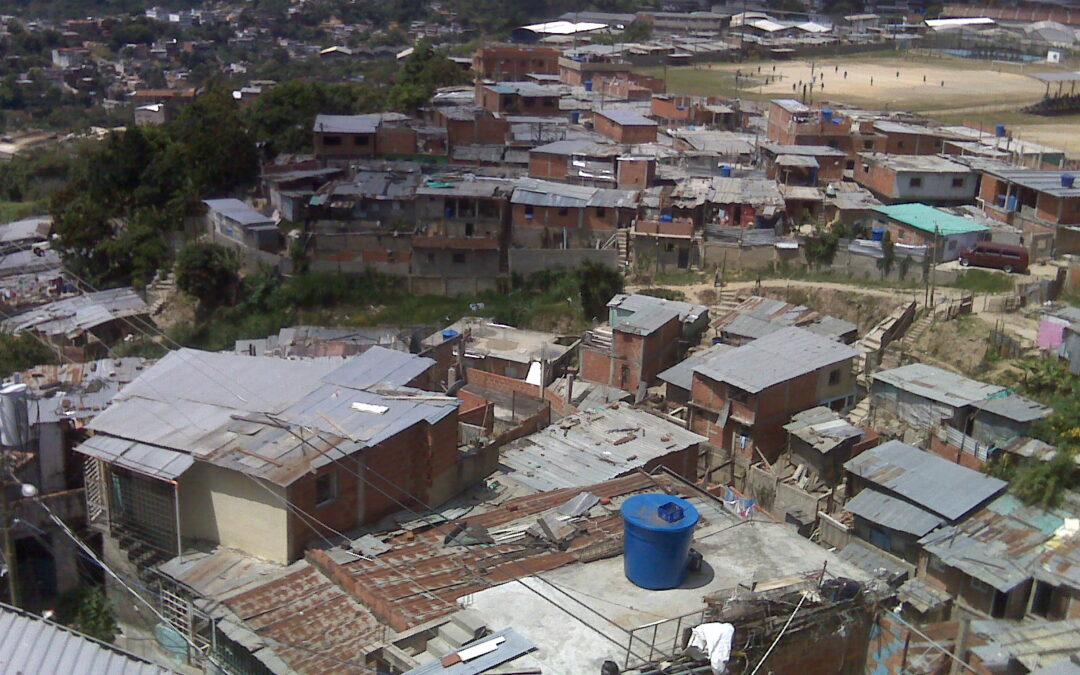
Mar 19, 2016 | Focolare Worldwide, Senza categoria
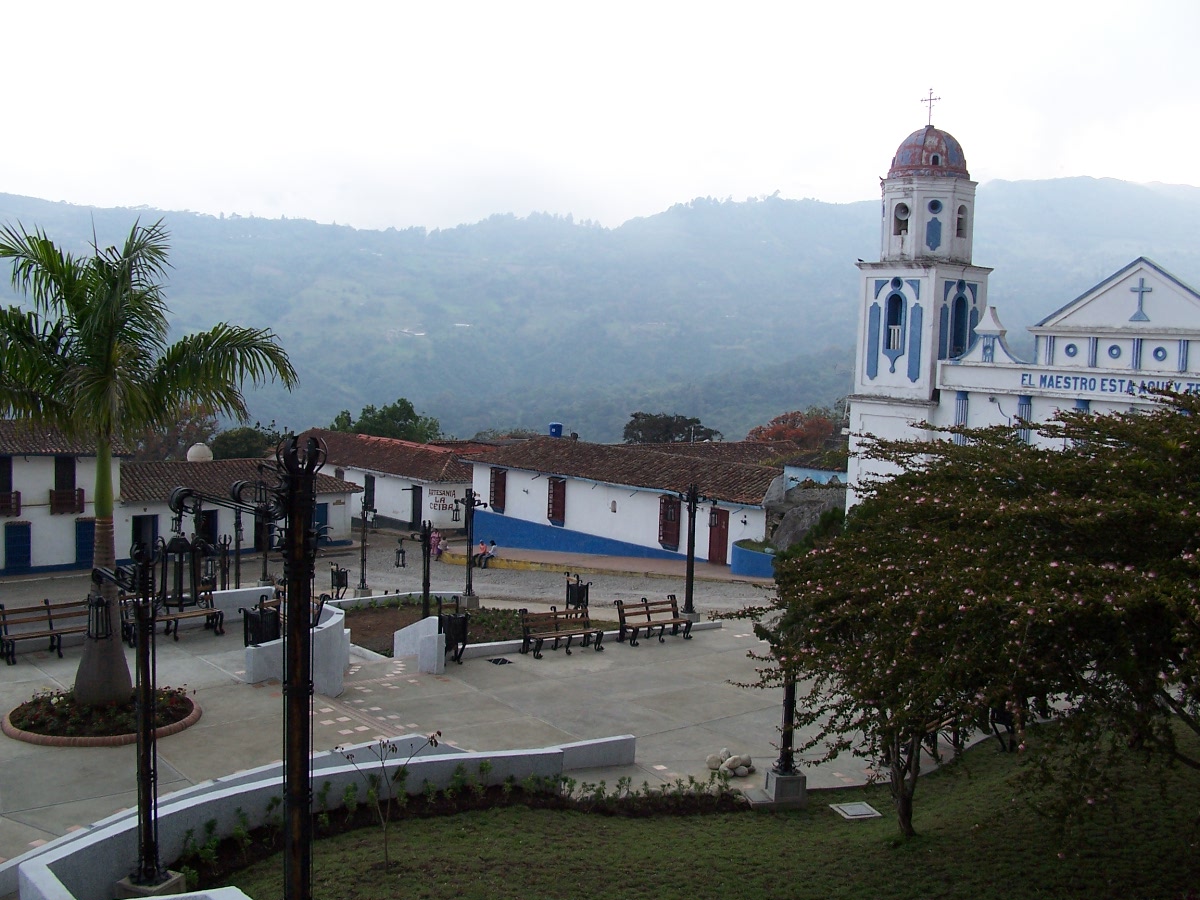 “In such a fractured and divided Venezuela we want to live the Gospel radically, wherever we work, or study, to build bridges of unity and peace. In the town council for example, there are 3 people who live the spirituality of unity, one belonging to the Government’s party and 2 in the opposing parties, and yet they respect and help one another.” One of them Ophelia, of the Focolare community speaks about a marginal district of the city of Valencia called Colinas de Guacamaya “A friend of mine asked me to accompany her to the doctor’s – she said and so the long waiting line started for the medicine: an old man in search of his treatment for diabetes, another asking for headache pills, a boy at the drug store asking for a painkiller. Just one pill, but he didn’t have enough money to pay for it.” But Ofelia had a bag of medicine in her car which she always brings along with her, with medicines that arrived from “Divine Providence”, as she herself recounts, and could offer them for free to all those who were there. The looks on their faces were of incredulity and gratitude. Betty and Orlando have 4 kids and they transferred to the “Little Cloud” Mariapolis Centre,in the district of Junquito, close to Caracas. “To serve those in need– Betty recounts –, we had lost touch with some members of the community so we organized the social pastoral. We wanted to respond to the need of food, clothing and homes for some families of the parish. So with the help of the town council, we managed to build a house fit to host a poor elderly man.” “The current social crisis, with the high in security indices the country is beset with, opened our hearts even more to the needs of the families in our community who live in fear of even losing their lives. We found out about a boy’s father who was in serious conditions due to a gunshot wound. in his head. We rushed to the hospital where he was admitted at the intensive care and died a few days later. We are now continuing to give our concrete love, with care and attention to protect the mother and son, whom we took in with us.”
“In such a fractured and divided Venezuela we want to live the Gospel radically, wherever we work, or study, to build bridges of unity and peace. In the town council for example, there are 3 people who live the spirituality of unity, one belonging to the Government’s party and 2 in the opposing parties, and yet they respect and help one another.” One of them Ophelia, of the Focolare community speaks about a marginal district of the city of Valencia called Colinas de Guacamaya “A friend of mine asked me to accompany her to the doctor’s – she said and so the long waiting line started for the medicine: an old man in search of his treatment for diabetes, another asking for headache pills, a boy at the drug store asking for a painkiller. Just one pill, but he didn’t have enough money to pay for it.” But Ofelia had a bag of medicine in her car which she always brings along with her, with medicines that arrived from “Divine Providence”, as she herself recounts, and could offer them for free to all those who were there. The looks on their faces were of incredulity and gratitude. Betty and Orlando have 4 kids and they transferred to the “Little Cloud” Mariapolis Centre,in the district of Junquito, close to Caracas. “To serve those in need– Betty recounts –, we had lost touch with some members of the community so we organized the social pastoral. We wanted to respond to the need of food, clothing and homes for some families of the parish. So with the help of the town council, we managed to build a house fit to host a poor elderly man.” “The current social crisis, with the high in security indices the country is beset with, opened our hearts even more to the needs of the families in our community who live in fear of even losing their lives. We found out about a boy’s father who was in serious conditions due to a gunshot wound. in his head. We rushed to the hospital where he was admitted at the intensive care and died a few days later. We are now continuing to give our concrete love, with care and attention to protect the mother and son, whom we took in with us.”  “Upon the request of the parish priest – María Carolina of the Junquito community recounts – we went to a rural zone that can be reached only by jeep. The Florida community were waiting for us, and in need of so many material things, and up to a few months earlier did not even have electricity. A community of sacrificed people, dedicated to farming and who walk kilometres to go to Mass once a month. An experience that involved all of us and which started up a communion of goods: from all over clothes, medicine, toys, shoes, food arrived… with trucks filled to the brim with goods but above all, hope, and love for this community. Even if difficulties are not missing, upon our arrival the people came out of their homes, running to meet us with applause, immediately imbuing a family atmosphere!.” The community of Puerto Ayacucho, in the State of Amazzona, is a border zone, inhabited by aborigine communities. They were beset with serious problems: the presence of guerillas, the exploitation of gold, a high rate of single mothers. It had just undergone a painful experience with the death of a boy, Felipe, a member of the Focolare, who had been killed two months earlier by gunshots. This is a frequent event in Venezuela, especially in this region. He had died to save the life of his brother who was wanted by the guerilla. Juan,his best friend, told us that «Felipe had set an appointment to enrol in the catechism class, but he died the day before… Together we had planned a lot for the future.» Felipe’s death had left a mark in this community: a new commitment to live to build peace, give new horizons and hope especially to the youth.
“Upon the request of the parish priest – María Carolina of the Junquito community recounts – we went to a rural zone that can be reached only by jeep. The Florida community were waiting for us, and in need of so many material things, and up to a few months earlier did not even have electricity. A community of sacrificed people, dedicated to farming and who walk kilometres to go to Mass once a month. An experience that involved all of us and which started up a communion of goods: from all over clothes, medicine, toys, shoes, food arrived… with trucks filled to the brim with goods but above all, hope, and love for this community. Even if difficulties are not missing, upon our arrival the people came out of their homes, running to meet us with applause, immediately imbuing a family atmosphere!.” The community of Puerto Ayacucho, in the State of Amazzona, is a border zone, inhabited by aborigine communities. They were beset with serious problems: the presence of guerillas, the exploitation of gold, a high rate of single mothers. It had just undergone a painful experience with the death of a boy, Felipe, a member of the Focolare, who had been killed two months earlier by gunshots. This is a frequent event in Venezuela, especially in this region. He had died to save the life of his brother who was wanted by the guerilla. Juan,his best friend, told us that «Felipe had set an appointment to enrol in the catechism class, but he died the day before… Together we had planned a lot for the future.» Felipe’s death had left a mark in this community: a new commitment to live to build peace, give new horizons and hope especially to the youth.
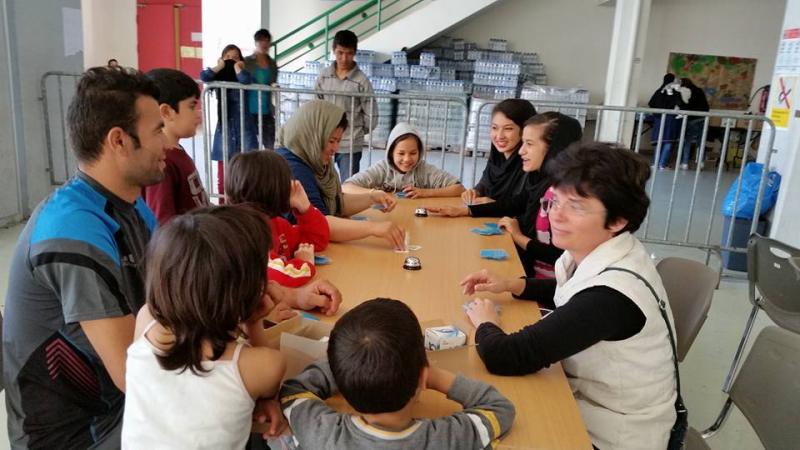
Mar 18, 2016 | Focolare Worldwide
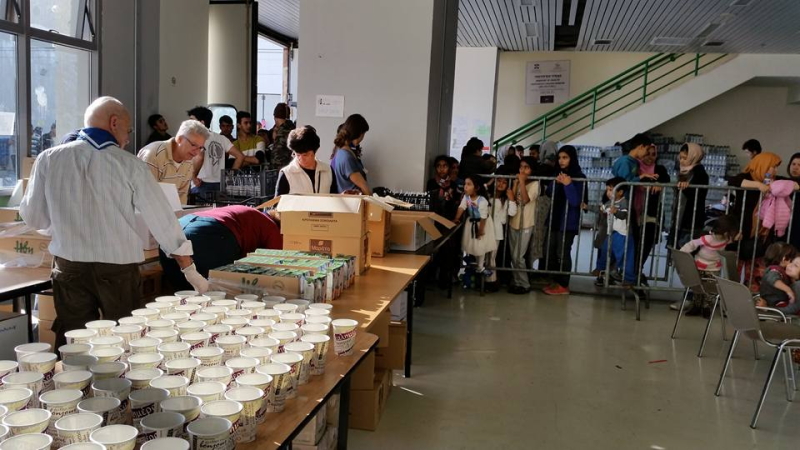 The flow of refugees has not stopped for months. They are living in a state of emergency on the islands of Lesbo, Kos, in Athens and in Idomeni. There are many secular and religious associations – Orthodox, Catholic, Protestant – and the NGOs that have never ceased to be there with help and assistance for these suffering people. The local community of the Focolare Movement, although small, both in Athens and in Salonica (Greece) has opened its arms and heart collaborating with several associations, including Caritas, The Pope John XXIII Community and others.
The flow of refugees has not stopped for months. They are living in a state of emergency on the islands of Lesbo, Kos, in Athens and in Idomeni. There are many secular and religious associations – Orthodox, Catholic, Protestant – and the NGOs that have never ceased to be there with help and assistance for these suffering people. The local community of the Focolare Movement, although small, both in Athens and in Salonica (Greece) has opened its arms and heart collaborating with several associations, including Caritas, The Pope John XXIII Community and others. 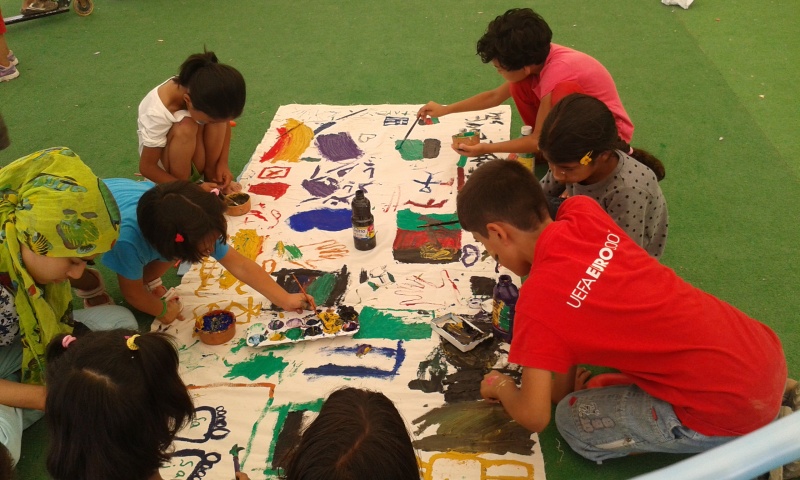 “Particularly in Athens,” they write, “we went to several refugee camps that are opened and closed according to the influx of arrivals. We have involved friends and colleagues in a food and clothing collection campaign to distribute to the different welcoming centres. From Salonica every week a group from the Focolare community in collaboration with Caritas, travels to the outskirts of Macedonia with relief and emergency aid.” “I went with some of my friends and colleagues from work to one camp where between 500 and 1000 people arrive each day,’ writes Mariangela from the focolare in Athens. “We help with the distribution of the meals, the sorting and mending clothing and play with the many, many children. We’d want to be able to say something to them, to share their burdens, but the language prevents us. The only way for us to communicate is with a smile, a caress and concrete deeds. In the end you feel like you’re able break through. It all seems so little in this sea of desperation, but we try to give at least one drop of love.”
“Particularly in Athens,” they write, “we went to several refugee camps that are opened and closed according to the influx of arrivals. We have involved friends and colleagues in a food and clothing collection campaign to distribute to the different welcoming centres. From Salonica every week a group from the Focolare community in collaboration with Caritas, travels to the outskirts of Macedonia with relief and emergency aid.” “I went with some of my friends and colleagues from work to one camp where between 500 and 1000 people arrive each day,’ writes Mariangela from the focolare in Athens. “We help with the distribution of the meals, the sorting and mending clothing and play with the many, many children. We’d want to be able to say something to them, to share their burdens, but the language prevents us. The only way for us to communicate is with a smile, a caress and concrete deeds. In the end you feel like you’re able break through. It all seems so little in this sea of desperation, but we try to give at least one drop of love.”  Maristella Tsamatropoulou, works on the National Greek Caritas Team: “The current refugee crisis doesn’t but expand the landscape of assistance that Caritas already began, to alleviate the Greek socio-economic crisis.” She explains, “It’s a matter of humanitarian aid that sees to the distribution of meals, of basic needs, both on the islands where the mass gatherings require it. . . but then the hospitality in hotels where there are the very important child care workers with their programmes for children, psychologists and the possibility to bathe. The different programmes that are structured and supported through foreign financing would never be able to carry out their work without the chain of solidarity that involves the efforts of so many volunteers on the front lines and on the back lines (the ones who make the appeals and collect the items).” At a pastry shop bar in Syros, the owners have involved their customers in gestures of solidarity such as collecting medicines, clothing and food, along with “A coffee waiting. . .” deal that allows you to leave a coffee for someone who is unable to pay. At Christmas, 235 people arrived! Some bread shops have begun “a loaf of bread waiting” in their businesses. “We’re so struck by the generosity and solidarity of the people,” they write from the Focolare community. “In spite of the serious financial crisis, the Greek people are pulling out all of their fraternal power, towards the poorest, finding unexpected energy and crativity to lift up so many people. It’s a true lesson in being human!”
Maristella Tsamatropoulou, works on the National Greek Caritas Team: “The current refugee crisis doesn’t but expand the landscape of assistance that Caritas already began, to alleviate the Greek socio-economic crisis.” She explains, “It’s a matter of humanitarian aid that sees to the distribution of meals, of basic needs, both on the islands where the mass gatherings require it. . . but then the hospitality in hotels where there are the very important child care workers with their programmes for children, psychologists and the possibility to bathe. The different programmes that are structured and supported through foreign financing would never be able to carry out their work without the chain of solidarity that involves the efforts of so many volunteers on the front lines and on the back lines (the ones who make the appeals and collect the items).” At a pastry shop bar in Syros, the owners have involved their customers in gestures of solidarity such as collecting medicines, clothing and food, along with “A coffee waiting. . .” deal that allows you to leave a coffee for someone who is unable to pay. At Christmas, 235 people arrived! Some bread shops have begun “a loaf of bread waiting” in their businesses. “We’re so struck by the generosity and solidarity of the people,” they write from the Focolare community. “In spite of the serious financial crisis, the Greek people are pulling out all of their fraternal power, towards the poorest, finding unexpected energy and crativity to lift up so many people. It’s a true lesson in being human!”
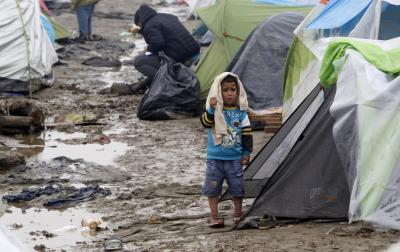
Mar 18, 2016 | Focolare Worldwide
 Thousands of refugees with hopes of crossing the Greek border live under tents in mud. The “mirage” is to reach Europe. Dolores Poletto is Croation. She works twice a week with Caritas Macedonia and lives in the focolare community in Skopje. She reports what she saw along the border. “I was at the refugee camp in Gevgelija, Macedonia with some colleagues from Caritas. It was an informal visit. On the other side of the border was a sea of people. We also crossed the border between Greece and Macedonia.” Closed Borders. The humanitarian crisis that refugees are enduring in Greece, Macedonia and Serbia is the result of the closing of border crossings along the Balkans migration route. On March 9, Slovenian authorities closed the border. Croatia has also announced that it will close its border and Serbia immediately announced the same. According to the most recent data – but the numbers are estimates – there are now some 14 thousand refugees at the Macedonian border. In Greece there are more than 34 thousand. Idomeni is like a funnel. The same thing is happening here that we have seen happening for months in Calais at the French border on the English Channel. The migrants arrive after having crossed through Greece and the Aegean on overloaded boats. “A multitude of people,” Dolores says. “They arrive in very poor condition . . . We’re on the border where before they crossed into Macedonia. People want to be as close as possible, so curtains have been put up behind the railway station.” Along with the mud, there is also the cold. “The daytime temperature is comfortable, rising as high as 18 degrees (C), but in the evening it drops to 2-3 degrees.” Living conditions in the camp deteriorate daily. Along with the cold, food is scarce and hygienic conditions are appalling. Many stand in line waiting for food,” Dolores says. “It’s hard to describe what their psychological state is like under such conditions. Many say that they’re from Syria. All of them would like to go to Germany, Austria . . . They have only one question for us: “When will the border open?” They’re prepared to do anything, so long as they reach their goal . . . ready even to die. “You know, I just heard news of 3 refugees who starved to death trying to cross illegally between Macedonia and Greece. This is so sad.” Caritas has been on the scene since the beginning, along with many other NGOs. “They’re waiting, hoping to cross the border,” Dolores explains. “That’s why they don’t want to move to more suitable camps. It’s difficult to help them.” The border police are here ensuring that no one crosses the border, in accordance with agreements made with Europe. When faced with this “impasse . . . you feel completely helpless.” Dolores has been deeply affected by this experience on the border. “We can stay with them on the Cross; I’m not able to forget those images. There are quite a few journalists there. I spoke with several of them and returned home to watch the news reports on TV. I said that if I had watched them without having visited that place, they would only have only been another series of daily news reports, but now after having touched it with my own hands, it feels more like a live wound on humanity’s body.” Source: SIR
Thousands of refugees with hopes of crossing the Greek border live under tents in mud. The “mirage” is to reach Europe. Dolores Poletto is Croation. She works twice a week with Caritas Macedonia and lives in the focolare community in Skopje. She reports what she saw along the border. “I was at the refugee camp in Gevgelija, Macedonia with some colleagues from Caritas. It was an informal visit. On the other side of the border was a sea of people. We also crossed the border between Greece and Macedonia.” Closed Borders. The humanitarian crisis that refugees are enduring in Greece, Macedonia and Serbia is the result of the closing of border crossings along the Balkans migration route. On March 9, Slovenian authorities closed the border. Croatia has also announced that it will close its border and Serbia immediately announced the same. According to the most recent data – but the numbers are estimates – there are now some 14 thousand refugees at the Macedonian border. In Greece there are more than 34 thousand. Idomeni is like a funnel. The same thing is happening here that we have seen happening for months in Calais at the French border on the English Channel. The migrants arrive after having crossed through Greece and the Aegean on overloaded boats. “A multitude of people,” Dolores says. “They arrive in very poor condition . . . We’re on the border where before they crossed into Macedonia. People want to be as close as possible, so curtains have been put up behind the railway station.” Along with the mud, there is also the cold. “The daytime temperature is comfortable, rising as high as 18 degrees (C), but in the evening it drops to 2-3 degrees.” Living conditions in the camp deteriorate daily. Along with the cold, food is scarce and hygienic conditions are appalling. Many stand in line waiting for food,” Dolores says. “It’s hard to describe what their psychological state is like under such conditions. Many say that they’re from Syria. All of them would like to go to Germany, Austria . . . They have only one question for us: “When will the border open?” They’re prepared to do anything, so long as they reach their goal . . . ready even to die. “You know, I just heard news of 3 refugees who starved to death trying to cross illegally between Macedonia and Greece. This is so sad.” Caritas has been on the scene since the beginning, along with many other NGOs. “They’re waiting, hoping to cross the border,” Dolores explains. “That’s why they don’t want to move to more suitable camps. It’s difficult to help them.” The border police are here ensuring that no one crosses the border, in accordance with agreements made with Europe. When faced with this “impasse . . . you feel completely helpless.” Dolores has been deeply affected by this experience on the border. “We can stay with them on the Cross; I’m not able to forget those images. There are quite a few journalists there. I spoke with several of them and returned home to watch the news reports on TV. I said that if I had watched them without having visited that place, they would only have only been another series of daily news reports, but now after having touched it with my own hands, it feels more like a live wound on humanity’s body.” Source: SIR
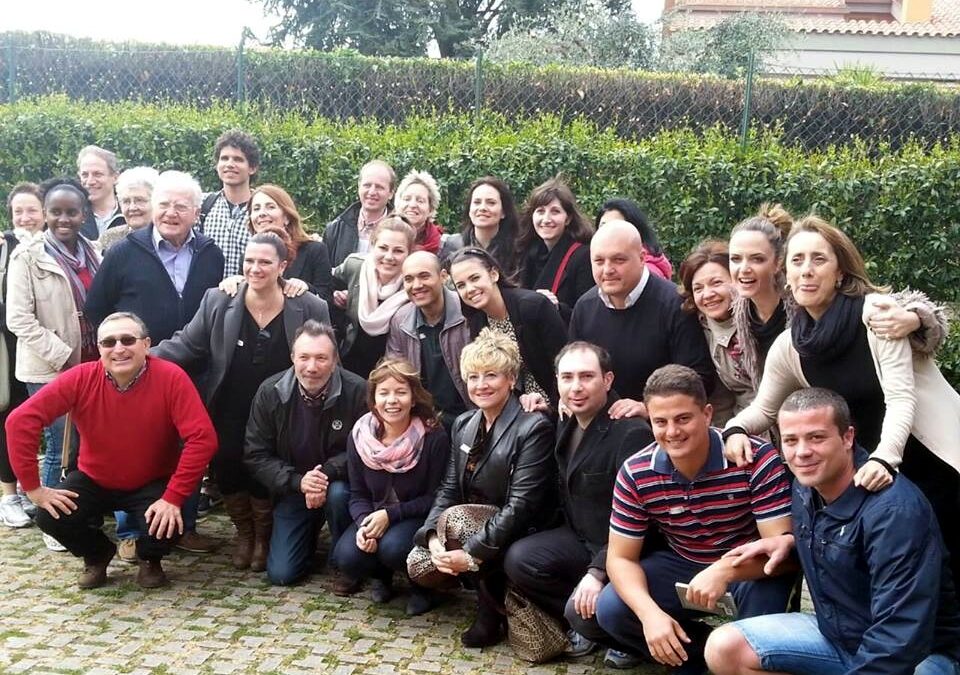
Mar 17, 2016 | Focolare Worldwide, Senza categoria
 “I started to give a hand, Annette, a German Focolarina recounts, “in December 2014. The cold had already set in and there was urgent need for blankets. In trying to find out more, a member of the RomAmoR ONLUS proposed: “More than blankets we need you to come and give us a hand.” The week after I was already at the Ostia station. It was a really moving experience. On approaching those people I discovered that oddly enough, they were the ones to welcome me! I realised that this is not an uncomfortable category of people to avoid, but persons who wish to relate with others, and are capable of imbuing human warmth. After a while also the volunteers came with a hot dinner and the anonymous, cold and bleak station, warmed up. ” Annette has changed since then. The first nights she couldn’t sleep thinking of Giovanni, Stefan, Mohamed who did not have a warm bed like hers. She started to review her wardrobe, to see if there was still something else she could share, despite the fact that in the Focolare community already tries to live only with the essentials. But above all, she continued going to the station every Monday. One evening, looking at the notebook that listed the requests of the homeless, she saw that a man needed a pair of shoes. Since there were none in the house she remembered Chiara Lubich’s experience during the war, when she asked Jesus present in the poor, for a pair of shoes. “So I did the same thing and in two weeks ten pairs of shoes arrived!”
“I started to give a hand, Annette, a German Focolarina recounts, “in December 2014. The cold had already set in and there was urgent need for blankets. In trying to find out more, a member of the RomAmoR ONLUS proposed: “More than blankets we need you to come and give us a hand.” The week after I was already at the Ostia station. It was a really moving experience. On approaching those people I discovered that oddly enough, they were the ones to welcome me! I realised that this is not an uncomfortable category of people to avoid, but persons who wish to relate with others, and are capable of imbuing human warmth. After a while also the volunteers came with a hot dinner and the anonymous, cold and bleak station, warmed up. ” Annette has changed since then. The first nights she couldn’t sleep thinking of Giovanni, Stefan, Mohamed who did not have a warm bed like hers. She started to review her wardrobe, to see if there was still something else she could share, despite the fact that in the Focolare community already tries to live only with the essentials. But above all, she continued going to the station every Monday. One evening, looking at the notebook that listed the requests of the homeless, she saw that a man needed a pair of shoes. Since there were none in the house she remembered Chiara Lubich’s experience during the war, when she asked Jesus present in the poor, for a pair of shoes. “So I did the same thing and in two weeks ten pairs of shoes arrived!”
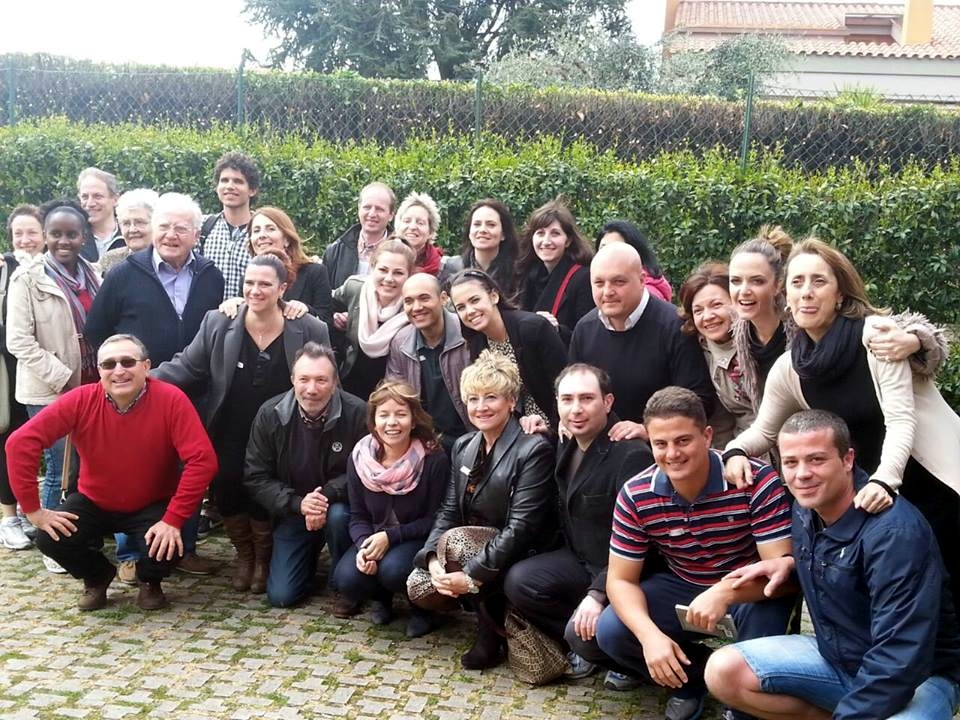
Photo © Dino Impagliazzo
Mar 16, 2016 | Focolare Worldwide, Senza categoria
“This soiree should have been held here three months ago. Instead, the folly of men changed our direction.” These were the opening words of Noufissa Boulif, Muslim, organiser of the event: after the attack in Paris on 13 November 2015, Brussels lost its identity. This is where some of the terrorists involved were based, and for security reasons the concert had been cancelled and moved to 20 February 2016. The encounter between music, and Muslim and Christian cultures, became a platform for the encounter between Muslims, Christians and also agnostics who believe in dialogue and who, knowing they were welcome, were able to receive the others and discover their hidden qualities and values. But wasn’t it highly risky, for an Islamic-Christian event right in the heart of Brussels? We asked Noufissa.”If the concert was able to go through, it was thanks to the incredible solidarity between Muslims and Christians, and certainly due to divine protection. Luckily the entire programme came about without accidents or tensions.” The concert was dedicated to all the children who suffer, giving the soiree the theme «of children and the youth, but also under the auspices of diversity which characterises our country.» For more than 20 years, Noufissa has known and lived Chiara Lubich’s spirituality of unity. She wants to testify before all that fraternity between Christians and Muslims, often antagonists, is possible. In this perspective she organized the first Islam-Christina concert in October 2014. https://vimeo.com/114676421 “I have been working on it for a long time”, Noufissa recounted. “Together with my husband and children, we are involved in interreligious dialogue, which has by now become part of my life. For me, as a Muslim wearing a veil, living in harmony with others is not to be taken for granted, because I feel that people look at you with curiosity or evident signs of diffidence. But every time, I try to approach them without prejudice, and with a smile. The Golden Rule which all great religions advocate, helps me a lot. “None of you really believes if you do not wish for your neighbor what you wish for yourself” (Mohammed, Hadith 13 de al-Nawawi). The islamophobic reactions and influence of the mass media are not always constructive or comprehensible, but the essential thing is to overcome them. The prophet, Mohammed, in a hadith stresses that “A smile is an alm” (meaning, a free gift for the other).” Going back to 20 February this year. Various choirs appeared on stage: children, youth, Christians and Muslims, blacks and whites. Speaking Neerlandish or French – also this is one of Belgium’s challenges, the participants were Rissala, the small choir singers, the voices of the dei 4 Horizons, and the ‘TOUCH,’ a group of disabled Muslim girls. Towards the end, also the rappers – Mc ‘Youns, and Antis et Mamz-I – with their incisive words, invited everyone not to give up, but to continue believing in life. The “light of the heart” association was formed after 25 years of Noufissa’s interreligious dialogues, and 10 years of the service of one of her Muslim friends involved in palliative treatments: together they visit the sick at their homes, trying to meet the thirst for relationships in their particular phases of life. With this association, after a year of hard work to prepare “Fraternity choir,” they are already working on a next Islam-Christian event to be held on 23 April entitled, “Together with Mary,” in the Saint Michel Cathedral in Brussels.
Mar 14, 2016 | Focolare Worldwide

 “In such a fractured and divided Venezuela we want to live the Gospel radically, wherever we work, or study, to build bridges of unity and peace. In the town council for example, there are 3 people who live the spirituality of unity, one belonging to the Government’s party and 2 in the opposing parties, and yet they respect and help one another.” One of them Ophelia, of the Focolare community speaks about a marginal district of the city of Valencia called Colinas de Guacamaya “A friend of mine asked me to accompany her to the doctor’s – she said and so the long waiting line started for the medicine: an old man in search of his treatment for diabetes, another asking for headache pills, a boy at the drug store asking for a painkiller. Just one pill, but he didn’t have enough money to pay for it.” But Ofelia had a bag of medicine in her car which she always brings along with her, with medicines that arrived from “Divine Providence”, as she herself recounts, and could offer them for free to all those who were there. The looks on their faces were of incredulity and gratitude. Betty and Orlando have 4 kids and they transferred to the “Little Cloud” Mariapolis Centre,in the district of Junquito, close to Caracas. “To serve those in need– Betty recounts –, we had lost touch with some members of the community so we organized the social pastoral. We wanted to respond to the need of food, clothing and homes for some families of the parish. So with the help of the town council, we managed to build a house fit to host a poor elderly man.” “The current social crisis, with the high in security indices the country is beset with, opened our hearts even more to the needs of the families in our community who live in fear of even losing their lives. We found out about a boy’s father who was in serious conditions due to a gunshot wound. in his head. We rushed to the hospital where he was admitted at the intensive care and died a few days later. We are now continuing to give our concrete love, with care and attention to protect the mother and son, whom we took in with us.”
“In such a fractured and divided Venezuela we want to live the Gospel radically, wherever we work, or study, to build bridges of unity and peace. In the town council for example, there are 3 people who live the spirituality of unity, one belonging to the Government’s party and 2 in the opposing parties, and yet they respect and help one another.” One of them Ophelia, of the Focolare community speaks about a marginal district of the city of Valencia called Colinas de Guacamaya “A friend of mine asked me to accompany her to the doctor’s – she said and so the long waiting line started for the medicine: an old man in search of his treatment for diabetes, another asking for headache pills, a boy at the drug store asking for a painkiller. Just one pill, but he didn’t have enough money to pay for it.” But Ofelia had a bag of medicine in her car which she always brings along with her, with medicines that arrived from “Divine Providence”, as she herself recounts, and could offer them for free to all those who were there. The looks on their faces were of incredulity and gratitude. Betty and Orlando have 4 kids and they transferred to the “Little Cloud” Mariapolis Centre,in the district of Junquito, close to Caracas. “To serve those in need– Betty recounts –, we had lost touch with some members of the community so we organized the social pastoral. We wanted to respond to the need of food, clothing and homes for some families of the parish. So with the help of the town council, we managed to build a house fit to host a poor elderly man.” “The current social crisis, with the high in security indices the country is beset with, opened our hearts even more to the needs of the families in our community who live in fear of even losing their lives. We found out about a boy’s father who was in serious conditions due to a gunshot wound. in his head. We rushed to the hospital where he was admitted at the intensive care and died a few days later. We are now continuing to give our concrete love, with care and attention to protect the mother and son, whom we took in with us.”  “Upon the request of the parish priest – María Carolina of the Junquito community recounts – we went to a rural zone that can be reached only by jeep. The Florida community were waiting for us, and in need of so many material things, and up to a few months earlier did not even have electricity. A community of sacrificed people, dedicated to farming and who walk kilometres to go to Mass once a month. An experience that involved all of us and which started up a communion of goods: from all over clothes, medicine, toys, shoes, food arrived… with trucks filled to the brim with goods but above all, hope, and love for this community. Even if difficulties are not missing, upon our arrival the people came out of their homes, running to meet us with applause, immediately imbuing a family atmosphere!.” The community of Puerto Ayacucho, in the State of Amazzona, is a border zone, inhabited by aborigine communities. They were beset with serious problems: the presence of guerillas, the exploitation of gold, a high rate of single mothers. It had just undergone a painful experience with the death of a boy, Felipe, a member of the Focolare, who had been killed two months earlier by gunshots. This is a frequent event in Venezuela, especially in this region. He had died to save the life of his brother who was wanted by the guerilla. Juan,his best friend, told us that «Felipe had set an appointment to enrol in the catechism class, but he died the day before… Together we had planned a lot for the future.» Felipe’s death had left a mark in this community: a new commitment to live to build peace, give new horizons and hope especially to the youth.
“Upon the request of the parish priest – María Carolina of the Junquito community recounts – we went to a rural zone that can be reached only by jeep. The Florida community were waiting for us, and in need of so many material things, and up to a few months earlier did not even have electricity. A community of sacrificed people, dedicated to farming and who walk kilometres to go to Mass once a month. An experience that involved all of us and which started up a communion of goods: from all over clothes, medicine, toys, shoes, food arrived… with trucks filled to the brim with goods but above all, hope, and love for this community. Even if difficulties are not missing, upon our arrival the people came out of their homes, running to meet us with applause, immediately imbuing a family atmosphere!.” The community of Puerto Ayacucho, in the State of Amazzona, is a border zone, inhabited by aborigine communities. They were beset with serious problems: the presence of guerillas, the exploitation of gold, a high rate of single mothers. It had just undergone a painful experience with the death of a boy, Felipe, a member of the Focolare, who had been killed two months earlier by gunshots. This is a frequent event in Venezuela, especially in this region. He had died to save the life of his brother who was wanted by the guerilla. Juan,his best friend, told us that «Felipe had set an appointment to enrol in the catechism class, but he died the day before… Together we had planned a lot for the future.» Felipe’s death had left a mark in this community: a new commitment to live to build peace, give new horizons and hope especially to the youth.






